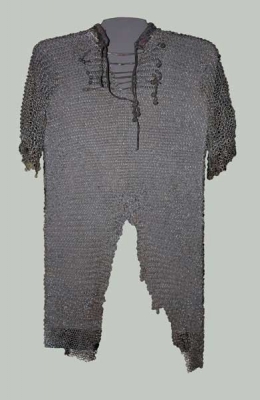Mail armour (1904.54.15)
 NigeriaMail armour from Nigeria, Africa. Collected by E. F. Martin. Purchased by the Museum from him in 1904.
NigeriaMail armour from Nigeria, Africa. Collected by E. F. Martin. Purchased by the Museum from him in 1904.
This is sulke (shirt) of mail from Kano, a city in Nigeria. It is of good quality with a leather collar and thongs and riveted links. In mass-produced armour, links were commonly butted together, which made for a faster method of manufacture but left the mail surface substantially weaker. The sulke was worn over quilted armour and the split down the front may be evidence of damage, as suggested by its collector, or it may be an intentional feature to make it more comfortable to wear on horseback.
It is likely that this piece was worn by a member of the Sokoto Caliphate cavalry, known as the yan lifida. The Caliphate had been founded in the early 1800s and was one of the most powerful empires in sub-Saharan Africa prior to European conquest and colonisation. Yan lifida were an elite force that served as the emir's bodyguard. Mail continued to be worn in Nigeria until the 20th century, although it was not manufactured there. Instead it was probably traded from the Islamic polities in the Sahel (the boundary strip across Africa separating the Sahara form the more fertile south).
Kano is the cultural capital of the Hausa people. The Hausa believed iron to be intimately related to the forces of life and death and thus dangerous in the wrong hands. Blacksmiths therefore formed a respected 'clan' within Hausa society and were considered as important as midwives, overseeing the delicate smelting process, using 'male' bellows and a 'female' furnace.





